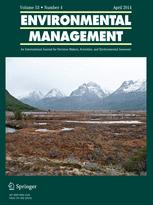Jean-Paul Zagarola and colleagues from the U.S.A. and Argentina recently published the cover article in the journal Environmental Management entitled “Perceiving Patagonia: An Assessment of Social Values and Perspectives Regarding Watershed Ecosystem Services and Management in Southern South America.” This research, which was funded by a Fulbright student grant and a U.S. National Science Foundation IRES award, was the first of its kind by simultaneously exploring the mentalities of “regular citizens” and “specialists” on both sides of the Fuegian Archipelago.
Research on human dimensions of ecosystems through the ecosystem services (ES) concept has proliferated over recent decades but has largely focused on monetary value of ecosystems while excluding other community-based values. This study conducted 312 surveys of general community members and regional researchers and decision makers to understand local perceptions and values of watershed ES and natural resource management in South America’s southern Patagonian ecoregion. Results indicated that specialists shared many similar values of ES with community members, but at the same time their mentalities did not capture the diversity of values that existed within the broader community. The supporting services were most highly valued by both groups, but generally poorly understood by the community. Many services that are not easily captured in monetary terms, particularly cultural services, were highly valued by community members and specialists. Both groups perceived a lack of communication and access to basic scientific information in current management approaches and differed slightly in their perspective on potential threats to ES.

